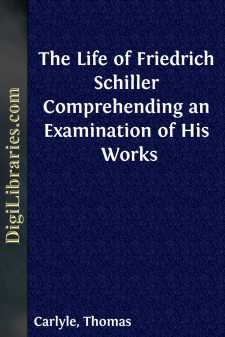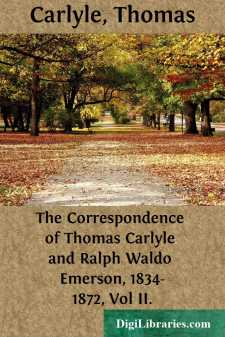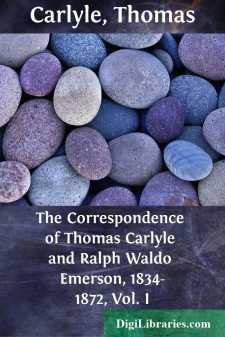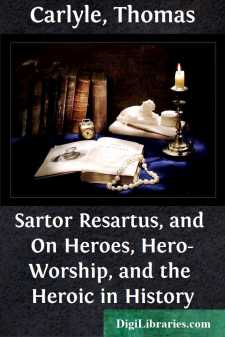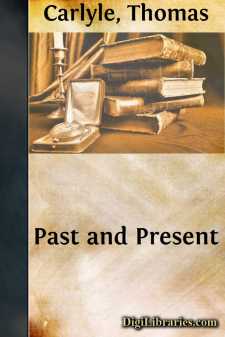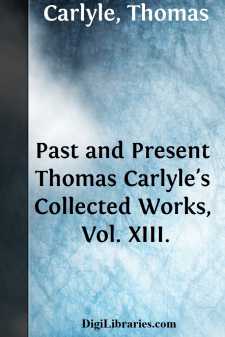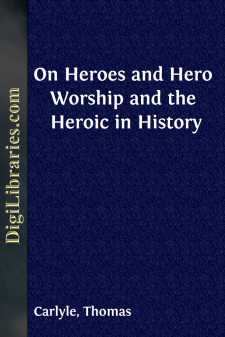Categories
- Antiques & Collectibles 13
- Architecture 36
- Art 48
- Bibles 22
- Biography & Autobiography 813
- Body, Mind & Spirit 142
- Business & Economics 28
- Children's Books 17
- Children's Fiction 14
- Computers 4
- Cooking 94
- Crafts & Hobbies 4
- Drama 346
- Education 46
- Family & Relationships 57
- Fiction 11829
- Games 19
- Gardening 17
- Health & Fitness 34
- History 1377
- House & Home 1
- Humor 147
- Juvenile Fiction 1873
- Juvenile Nonfiction 202
- Language Arts & Disciplines 88
- Law 16
- Literary Collections 686
- Literary Criticism 179
- Mathematics 13
- Medical 41
- Music 40
- Nature 179
- Non-Classifiable 1768
- Performing Arts 7
- Periodicals 1453
- Philosophy 64
- Photography 2
- Poetry 896
- Political Science 203
- Psychology 42
- Reference 154
- Religion 513
- Science 126
- Self-Help 84
- Social Science 81
- Sports & Recreation 34
- Study Aids 3
- Technology & Engineering 59
- Transportation 23
- Travel 463
- True Crime 29
Thomas Carlyle
Thomas Carlyle was a Scottish philosopher, satirical writer, essayist, historian, and teacher known for his complex and vivid prose. Born on December 4, 1795, in Ecclefechan, Scotland, he became a leading figure in the Victorian era with works like "Sartor Resartus" and "The French Revolution: A History." Carlyle's writings often delved into themes of heroism, social critique, and the importance of strong leadership.
Author's Books:
Sort by:
by:
Thomas Carlyle
PART FIRST. Among the writers of the concluding part of the last century there is none more deserving of our notice than Friedrich Schiller. Distinguished alike for the splendour of his intellectual faculties, and the elevation of his tastes and feelings, he has left behind him in his works a noble emblem of these great qualities: and the reputation which he thus enjoys, and has merited, excites our...
more...
by:
Thomas Carlyle
Chapter 1.1.I. Louis the Well-Beloved. President Henault, remarking on royal Surnames of Honour how difficult it often is to ascertain not only why, but even when, they were conferred, takes occasion in his sleek official way, to make a philosophical reflection. 'The Surname of Bien-aime (Well-beloved),' says he, 'which Louis XV. bears, will not leave posterity in the same doubt. This...
more...
by:
Thomas Carlyle
CORRESPONDENCE OF CARLYLE AND EMERSON LXXVI. Emerson to Carlyle Concord, 1 July, 1842 My Dear Carlyle,—I have lately received from our slow friends, James Munroe & Co., $246 on account of their sales of the Miscellanies,—and I enclose a bill of Exchange for L51, which cost $246.50. It is a long time since I sent you any sketch of the account itself, and indeed a long time since it was posted,...
more...
by:
Thomas Carlyle
I. Emerson to Carlyle Boston, Massachusetts, 14 May, 1884 My Dear Sir,—There are some purposes we delay long to execute simply because we have them more at heart than others, and such an one has been for many weeks, I may say months, my design of writing you an epistle. Some chance wind of Fame blew your name to me, perhaps two years ago, as the author of papers which I had already distinguished (as...
more...
by:
Thomas Carlyle
CHAPTER I. PRELIMINARY. Considering our present advanced state of culture, and how the Torch of Science has now been brandished and borne about, with more or less effect, for five thousand years and upwards; how, in these times especially, not only the Torch still burns, and perhaps more fiercely than ever, but innumerable Rushlights, and Sulphur-matches, kindled thereat, are also glancing in every...
more...
by:
Thomas Carlyle
INTRODUCTION One of the most vital and pregnant books in our modern literature, “Sartor Resartus” is also, in structure and form, one of the most daringly original. It defies exact classification. It is not a philosophic treatise. It is not an autobiography. It is not a romance. Yet in a sense it is all these combined. Its underlying purpose is to expound in broad outline certain ideas which lay at...
more...
by:
Thomas Carlyle
INTRODUCTION Being an appreciation from "The Dial" (July 1843) by Ralph Waldo Emerson Here is Carlyle's new poem, his Iliad of English woes, to follow his poem on France, entitled the History of the French Revolution. In its first aspect it is a political tract, and since Burke, since Milton, we have had nothing to compare with it. It grapples honestly with the...
more...
by:
Thomas Carlyle
CHAPTER I. MIDAS. The condition of England, on which many pamphlets are now in the course of publication, and many thoughts unpublished are going on in every reflective head, is justly regarded as one of the most ominous, and withal one of the strangest, ever seen in this world. England is full of wealth, of multifarious produce, supply for human want in every kind; yet England is dying of inanition....
more...
by:
Thomas Carlyle
BIOGRAPHICAL INTRODUCTION. There comes a time in the career of every man of genius who has devoted a long life to the instruction and enlightenment of his fellow-creatures, when he receives before his death all the honours paid by posterity. Thus when a great essayist or historian lives to attain a classic and world-wide fame, his own biography becomes as interesting to the public as those he himself...
more...
by:
Thomas Carlyle
LECTURES ON HEROES. LECTURE I. THE HERO AS DIVINITY. ODIN. PAGANISM: SCANDINAVIAN MYTHOLOGY. [May 5, 1840.] We have undertaken to discourse here for a little on Great Men, their manner of appearance in our world's business, how they have shaped themselves in the world's history, what ideas men formed of them, what work they did;—on Heroes, namely, and on their reception and performance;...
more...


